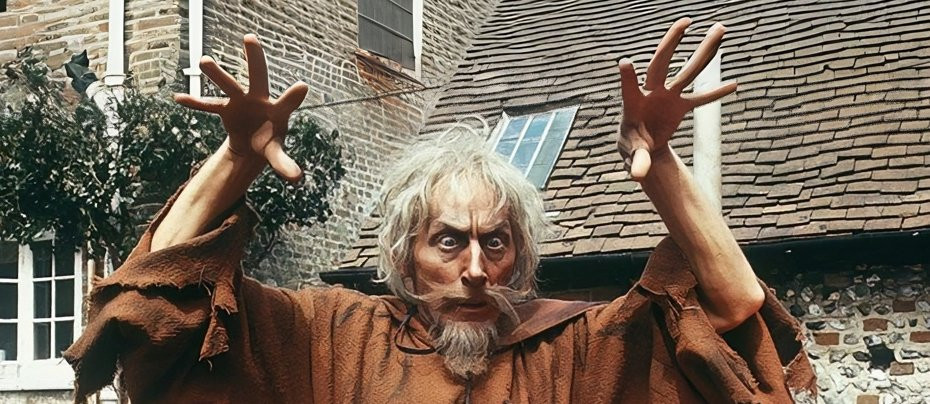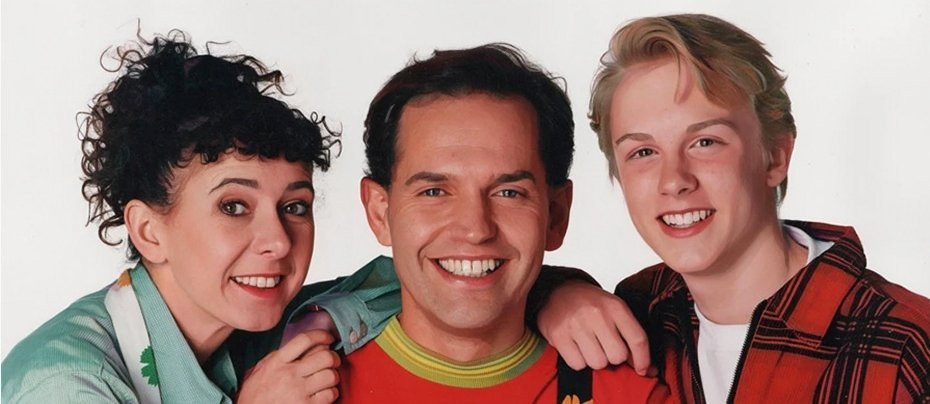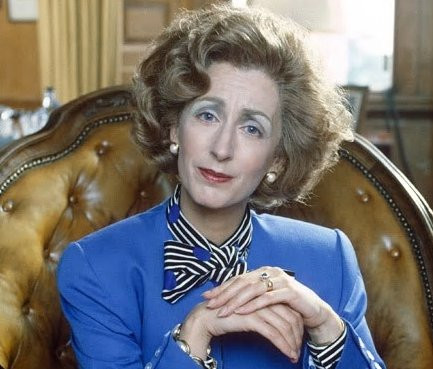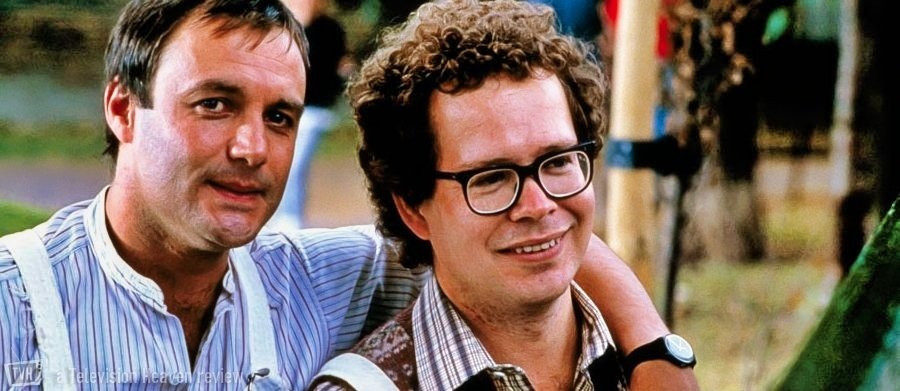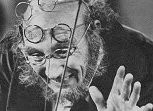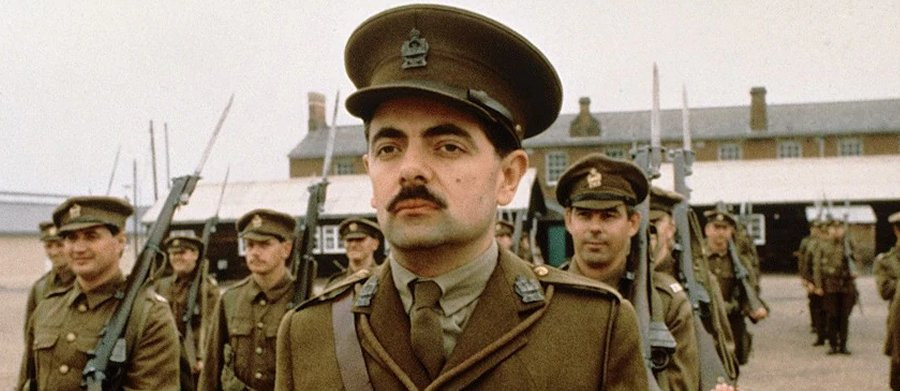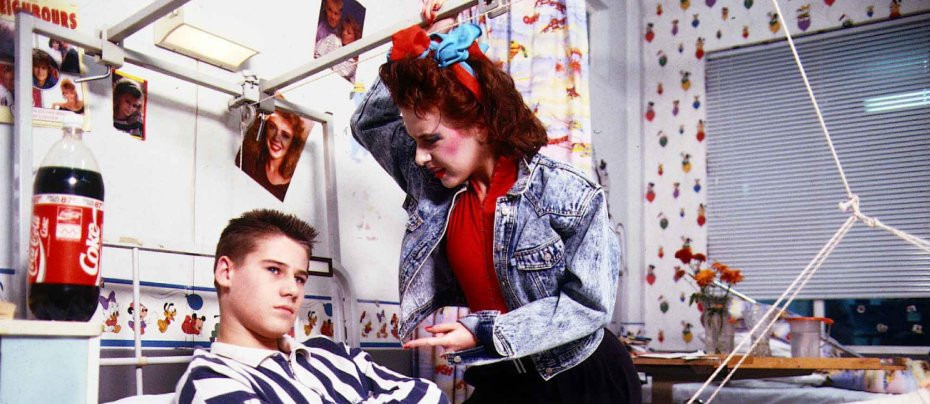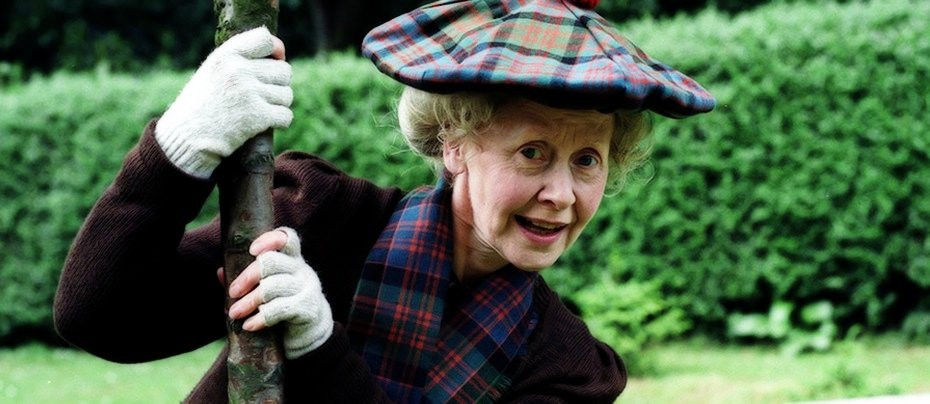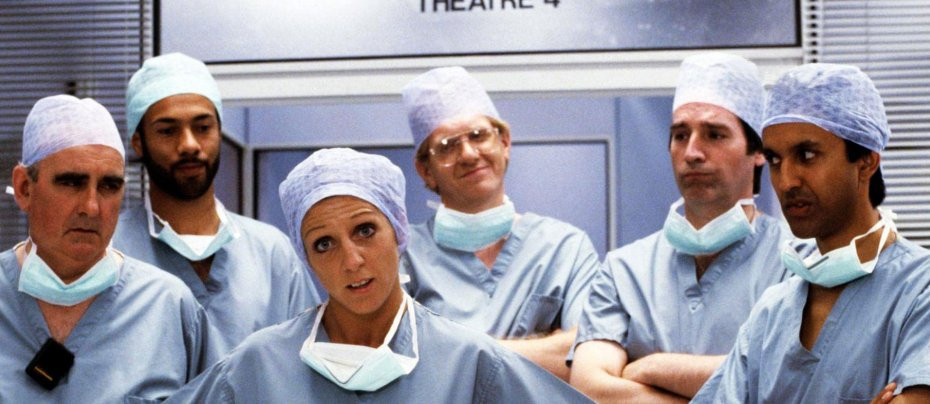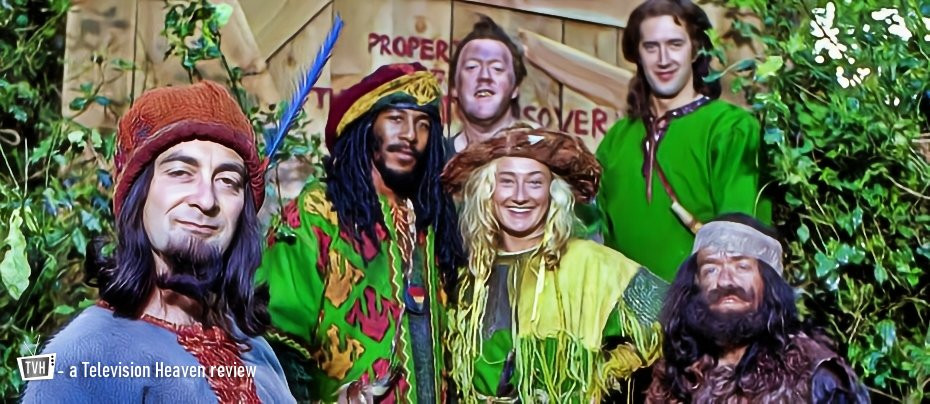
Maid Marian and Her Merry Men
1989 - United KingdomMarian was stuck with a band of absolute idiots as her Merry Men
Review by Daniel Tessier
The legend of Robin Hood is one of the most enduring in the English language, having been retold again and again across the centuries in prose, play and song. The twentieth century saw the legend reworked for film and television, but surely no version of the legend ever really came close to the truth of events? No, for the true story of what happened in Sherwood Forest, you have to look beyond the tales of Robin Hood, to that of Maid Marian.
Marian didn’t even appear in the ancient mediaeval tellings of the tale, but was reworked, it seems, from other folkloric traditions and misremembered histories, being inserted into the legend in the late 16th century. Over the years, she has been portrayed as a high-born noblewoman, a tomboyish adventurer, a virginal paragon, a damsel in distress and a bawdy trull. In 1989, as the 20th century was drawing to a close, Tony Robinson finally gave us a retelling of the legend that did Maid Marian justice, with a series that showed her in her role as the real hero.
Maid Marian and Her Merry Men was a children’s comedy adventure that ran across four series from 1989 to 1994. Robinson was best known then for his role as Baldrick in the Blackadder saga, which had come to a close only a fortnight before the first episode of Maid Marian was broadcast. Nowadays, he’s almost as well-known for his work on the enormously successful archaeological series Time Team. Other credits include his role as presenter of Stay Tooned during roughly the same period as Maid Marian, many historical documentaries such as The Worst Jobs in History and vocal work on children’s series such as Nellie the Elephant. The combination of comedy, history and children’s storytelling would seem to be his ideal format.
Robinson has cited several inspirations for the series, including a pantomime that similarly had Marian in a lead role, and watching his then seven-year-old daughter playing with boys and immediately taking charge. Doubtless his years of work on the historical comedy of Blackadder also influenced him; indeed, Blackadder co-creator Richard Curtis performed uncredited script work on the earliest episodes. However, Maid Marian is an altogether dafter, more anarchic affair. Every episode features at least one song, and absurd elements that have no place in 13th century Nottinghamshire.
The scripts make gleeful references to all manner of pop culture of the time, from The Crystal Maze and Comic Relief to other screen versions of the Robin Hood story. Notably, ITV’s Robin of Sherwood, fresh in the public mind having finished only three years earlier, is lampooned in the final episode of the first series, “The Whitish Knight.” Robin of Sherwood was eclipsed in the public eye by 1991’s Hollywood blockbuster Robin Hood: Prince of Thieves, which notably arrived after the first two series of Maid Marian and can therefore only be considered a pastiche of Robinson’s classic.

The series centres around Maid Marian herself, an idealistic freedom fighter who gathers a gang of Merry Men around her as part of her quest to rid the country of tyranny and taxes. Kate Lonergan (Parallel 9, Four Fathers) starred as Marian, portraying her with a wonderful mix of passion, adventure and sheer exasperation, under a tangled blonde wig. It was Marian who called the shots, masterminded the plans, and leapt into action without hesitation.
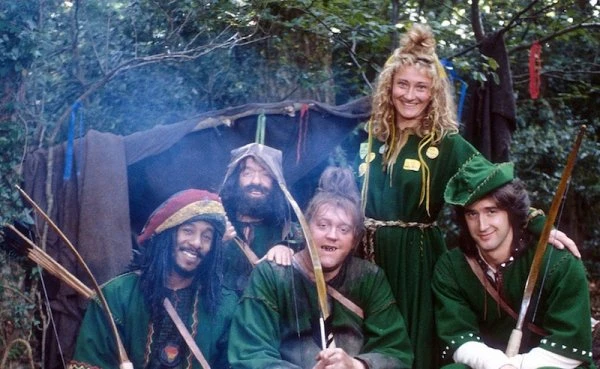
Unfortunately, Marian was stuck with a band of absolute idiots as her Merry Men. Most prominent was Robin of Kensington, played by Wayne Morris (AKA Adam Morris – Backup, I Dream). Handsome, impeccably dressed, vain and entirely clueless, Robin was a tailor and designer before he accidentally joined the gang and only stayed because it helped his cool image. While he did cement the gang's look (all in green to coordinate with the trees) he caused far more trouble than he solved. Due to a misunderstanding, the people of Nottingham were under the impression that he was the leader, his fame rising as he was incapable of keeping his face obscured no matter how insistently he was reminded (“Robin – hood!”). Ironically, while Marian's position as the leader and hero set the series apart from other Robin Hood adaptations, Morris's hilarious turn as the yuppie-styled Robin made him the standout character.
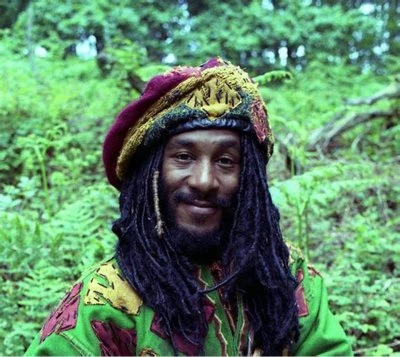
The remaining Merry Men were Barrington (Danny John-Jules – Red Dwarf, Death in Paradise), a Rastafarian who sang and rapped his way through the episodes, often narrating the events for the audience; Little Ron (Mike Edmonds – Time Bandits, The Storyteller), an angry dwarf who would resort to violence at the first hint of trouble; and Rabies, Worksop's large, insanely strong, good-natured village idiot. Rabies was played by the late Howard Lew Lewis, who had appeared twice in the first series of The Black Adder and also played a Merry Man in Prince of Thieves – officially named Hal, but no doubt the very same Rabies we know and love.

Marian and her ragtag band were pitted against several nefarious, if largely inept villains. Robinson gave himself the choice role of the Sheriff of Nottingham, a devious and cunning individual always on the lookout for a way to make money and better his position (so not a million miles away from Blackadder...) Nottingham was the only character to share Marian's intelligence, and they found themselves on the same side on occasion, but were for the most part bitter enemies.

Ruling with an iron fist over England in general and Worksop in particular was King John, played with oily brilliance by Forbes Collins (Poldark, Bull Week). A neurotic, vain manchild, John was obsessed with being remembered by history as a popular king, but still taxed his people mercilessly and enjoyed cosy days in torturing prisoners in the castle dungeons. Collins, who had also made brief appearances on The Black Adder, also played John's brother, King Richard the Lionheart, and his sister, the fair Queen Eleanor.
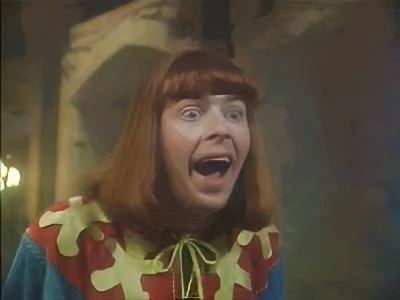
Eleanor's son, Guy of Gisborne (Ramsey Gilderdale - Blackadder's Christmas Carol) arrives halfway through the second series and sticks around to cause his uncle and the Sheriff constant problems. A babbling nincompoop, Guy spent much of his time playing with his imaginary friend (in spite of being 27) and would be a perfect candidate for village idiot if he wasn't rich enough to buy most villages. While he gets in the way, the Sheriff's two henchmen, castle guards Gary and Graham (Mark Billingham and David Lloyd) try their best to keep order and carry out their missions. They're almost as inept as Guy, but are nice sorts really, aside from all the killing. Billingham and Lloyd also wrote the first episode of series four, “Tunnel Vision.”

Worksop is inhabited by various peasants, notably the elderly Gladys (Hilary Mason – Z-Cars, Aquila) and the gormless Snooker (Robin Chandler) and various young girls who were inevitably smarter than the adults, played variously by Kellie Bright (EastEnders, T-Bag), Kerry Potter (Us Girls), Karen Salt (Julia Jekyll and Harriet Hyde) and Carley Britnell. The last of these played Hayley, in whose honour was named the legendary cosmic phenomenon, Hayley's Vomit.
While there were various one-off enemies from both within and without the village, more notable was Rotten Rose (Siobhan Fogarty), who went to school with Marian and was now her best friend/archrival/worst enemy (depending on the day). Rose, self-described Number One Robin Hood Fan, acted out of pure selfishness and would sell out the Merry Men and side with the Sheriff if it meant getting what she wanted.
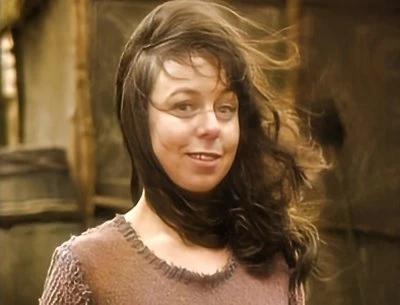
Each episode would see the gang pitted against the Sheriff and whichever villain-of-the-week might have dropped in, through increasingly ridiculous storylines. The first series saw Robin dress up as a chicken in order to enter an archery competition (parodying a similar disguise in Disney's Robin Hood classic film) and an attempt to have a new game named “John” catch on so that the King would be remembered (the game involved lots of balls on a table covered in green felt – can you guess which villager it was eventually named after?) 1990's second series got sillier, with such storylines as “The Worksop Egg Fairy,” the charity-themed “Little Brown Noses” and the wonderful “Rabies in Love.”
There was a long break between series two and three, with the latter finally arriving in 1993. By then, any semblance of logic had been thrown out the window, with wildly anachronistic and absurd plotlines involving alien invasions, enormous beansprouts and giant jelly baby in the shape of the King. The wonderful Patsy Byrne (Nursey on Blackadder II) made a guest appearance as Marian's mum. 1993 also saw a Christmas special, “Much, the Mini-Mart Manager's Son,” guest-starring Philip Wright (EastEnders, The Innocents). By the final series in 1994, Robin's evil doppelganger Clem Costner had turned up, King John forced the villagers to build a holiday camp, and then abdicated and joined the Merry Men. The final episode saw the gang visit a parallel universe where Rabies was a genius.
While the madcap scripts were a huge part of the comedy, Maid Marian really stuck in the memory of the children watching because of the songs. While many of the cast were dubbed, John-Jules, Billingham and Lloyd would usually sing their own lyrics. At least one original song was featured in each episode, sometimes two or three, including such classics as “The Mud Song,” “A Selection of Amusing Things” and, of course, “Pancake Day” (“P-p-p-p-p-p-p-p-pancake Day!”) Plus, every episode ended with perhaps the greatest theme song of all time playing over the credits.
Maid Marian and Her Merry Men was a huge success, winning the BAFTA for Best Children's Programme in 1990 and spawning a truly excellent comicbook adaptation, illustrated by Paul Cemmick, serialised in the Young Telegraph newspaper supplement. It was even adapted into a stage musical by Robinson, Billingham and Lloyd. Maid Marian remains one of the best remembered and most beloved children's series of its era. Robinson has, on several occasions, suggested his interest in reviving the programme, but nothing has come of this. Thankfully, popular demand led to repeats and a complete DVD release in the 2000s, without which the series may have been destined to pass into legend itself.
Seen this show? How do you rate it?
Seen this show? How do you rate it?
Published on February 13th, 2024. Written by Daniel Tessier for Television Heaven.


